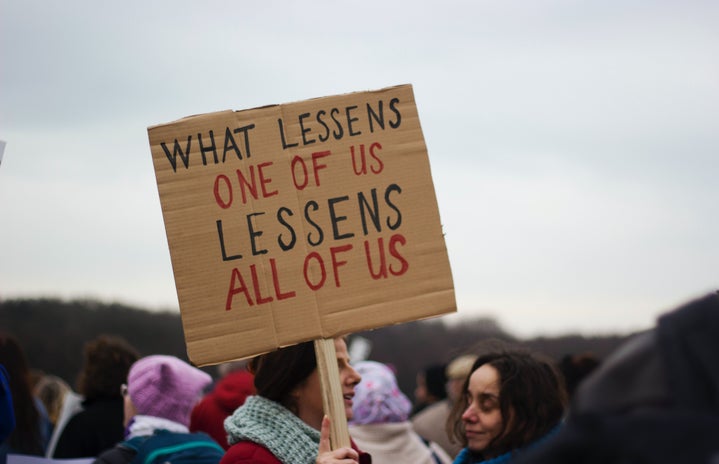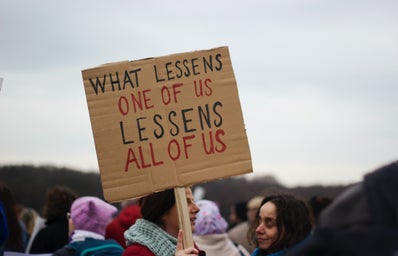I remember so clearly what it felt like to be an 8 year old living in the Rust Belt during President Obama’s presidential campaign and subsequent tenure in office and seeing firsthand the impact that government can have on the lives of its constituents — be it both positive and negative.
I also remember being 15 years old and watching the Democratic Primary between former Secretary Hillary Clinton and Senator Bernie Sanders and feeling both so empowered to become involved in the political process and so incredibly frustrated about how we have allowed what was once considered the Freest Country in the world to deteriorate to the state it was currently in. I saw a need for radical, structural change and I became incredibly dissatisfied with the status quo that certain wings of the Democratic Party seemed to cling to so desperately.
Related: A Cover Letter to College Women, from Bernie Sanders
As frustrating as Sanders’ loss in the primaries was for me considering the information leaked about the DNC’s (alleged) ‘rigging’ of the primaries, I had some modicum of hope for an outcome in the general election that I could live with — even if it wasn’t ideal. As it was for many of us, Election Day in 2016 was a turning point for me. I could see so clearly the missteps of the party establishments that had led us to this point and I couldn’t fathom how the political elites couldn’t see the obvious structural problems within their own organizations. There is little doubt in my mind that if the DNC had allowed the primary contests to take place without intervention, Clinton would have won the presidency. Regardless of the factions in America that would never vote for a Clinton, she was a compelling candidate with experience and support from high profile figures — everyone from Beyonce to Barack Obama and Bernie Sanders himself. Many campaign “surprises” followed the leak, but I could see the cracks beginning to form from that moment on, even if it truly crumbled much later.
Beginning in those moments, I lost my faith in political establishment. There was extreme danger in assuming that Americans would reliably vote for who was handpicked by party leadership in both the Republican and Democrat camps as the “safe candidate” or that the letter next to a candidate’s name would be enough to guarantee a win. It showed me that simply being “the lesser of two evils” or “comparatively better” will never be enough, no vote is guaranteed — be it in a red, blue or purple state — and all of them must be earned, regardless of the opponent.
Given this, it was an understatement to say that I had very low expectations for the primary contests leading up to the 2020 Presidential Election. Before he entered the race, we knew Joe Biden was likely to be the nominee despite a more than questionable record, several failed presidential bids and several high-profile controversies — does this sound familiar to anyone else?
Related: Joe Biden is Not the Answer
Despite the fact that I had wholeheartedly supported Bernie Sanders in 2016, I didn’t immediately throw my support behind him. The field was wide and the political landscape was different. I wanted to explore the options and watch a few debates before making a concrete decision. While there were several candidates I liked and hoped to see more from in the future, none of them felt “ready” to be President — at least in my opinion — in 2020, although I did feel several of them have incredibly bright futures. It also struck me that most of the candidates were attempting to use a watered-down version of Bernie Sanders’ 2016 platform in an attempt to leverage his widespread support and attract moderates to form a coalition.
Given this and the impact his campaign and advocacy efforts had on me personally, I once again supported Bernie Sanders in the primaries by volunteering, donating and voting. However, this wasn’t my first rodeo and I could very clearly see the writing on the wall. It was obvious from the start that the DNC had picked Joe Biden to be the nominee and they slowly convinced the opposing candidates to drop out one by one, with most of them out by Super Tuesday. As frustrating as it was to watch, it was undoubtedly necessary to whittle the field down and see more realistic numbers for how a smaller group of candidates would perform nationally.
Once it was a two man race, the DNC and like-minded media organizations hunkered down to bury Biden’s credible sexual assault allegations from former staffer, Tara Reade, and provide missleading (at best) coverage on the actual state of the delegate count. The final straw came following the onset of COVID-19 in the United States. The DNC began imposing delegate penalties on the states who chose to push their primaries back, leaving state leadership in a very difficult position. Meanwhile, Sanders largely stopped campaigning and shifted all of his volunteer and fundraising resources towards relief. He stopped running for President and simply started acting like one. He no longer encouraged supporters to get out and vote, because this critical moment was more important than any one election. While I was gutted, I was unsurprised to eventually see the news that Bernie Sanders had suspended his presidential campaign.
However, when watching his address to his supporters, the overarching sentiment of his message has echoed in me since: the struggle continues.
Sanders reminded viewers and supporters that regardless of the fate of his campaign, our movement has won the ideological battle in both 2016 and 2020. Ideas that were previously laughed off as “fringe” or “communist” are now a part of the Democratic Party platform and supported by the majority of Americans in red states, blue states and purple states. Medicare for All, a living wage for all workers, free and reduced price public colleges and more are now likely to be implemented in the next 10 years, which was previously unfathomable.
Most importantly, he reminded us both on the live stream and in messages directly to campaign volunteers that this movement and campaign was never about him — it was about us. It was about minorities and marginalized groups, it was about preserving the planet for our children and grandchildren, it was about protecting workers and middle class Americans, it was about preserving and improving our institutions before it’s too late to do so. Sure, it was also about winning the presidency, but it definitely wasn’t about beating Joe Biden. It was — and is — bigger than that.
This is not the end of Bernie Sanders’ political revolution, in fact, it’s only the beginning. True change does not occur from the top down, it comes from grassroot organizing for the candidates and issues that matter and promoting youth involvement in politics. It comes from refusing to sit down and be quiet. It comes from demanding better from our elected officials, regardless of the letter next to their name. It would have been easier to create the change we wished to see with a Sanders presidency, but that was only ever Phase 1. Phase 2 and 3 have only just begun — and I can’t wait to see where this journey takes our country.
We have watched Sanders fight for justice throughout his life; being arrested in Civil Rights demonstrations, refusing to vote in favor of the senseless Iraq War, and fighting for basic human rights for Amazon and Disney workers on a national scale. He has spent the better part of a century fighting for us. In 2016 and 2020 we fought for him. Now, in 2020 and beyond, we must fight for us. Bernie Sanders planted the seeds in 2016, in 2019 and 2020 we all watered them and tomorrow we will see them bloom.
We will see this movement forward. When we stand together, the struggle continues.



